Holidays in Bulgaria
Holidays in Bulgaria are bright and cheerful; they have a unique atmosphere. Kids and adults, locals and tourists love Bulgarian national festivals and events. Where else can you meet so-called kukeri – people wearing strange costumes and masks, see fire dancing nestinars, bathe in the due, or taste incredible national cuisine? Today, we invite you for an online tour of the holidays in Bulgaria. It is certain, however, that the day will come soon when you will be able to feel their beauty in reality.
Winter holidays in Bulgaria
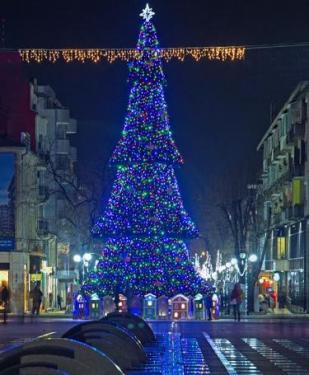 The first festive day we can’t help telling you about is Nikulden or a Day of St. Nicholas on the 6th of December. The saint is considered to be the patron of sailors, fishermen, bankers, and merchants, thus he is especially honored in the Burgas region. In the center of Burgas city, on the marinas of Tsarevo, Sozopol, and Achtopol, people cook Bulgarian fish soup chorba, and everyone can taste it. At home, one would enjoy stuffed carp, pickled mackerel, and baked bluefish.
The first festive day we can’t help telling you about is Nikulden or a Day of St. Nicholas on the 6th of December. The saint is considered to be the patron of sailors, fishermen, bankers, and merchants, thus he is especially honored in the Burgas region. In the center of Burgas city, on the marinas of Tsarevo, Sozopol, and Achtopol, people cook Bulgarian fish soup chorba, and everyone can taste it. At home, one would enjoy stuffed carp, pickled mackerel, and baked bluefish.
Right after the Nikulden, squares, streets, and buildings are decorated for Christmas and New Year. Green beautiful fir trees start shining with colorful lights; apartment windows fill up with coziness and warmth and glitter with garlands, decorations, and toys. Christmas in Bulgaria is celebrated on the 25th of December.
On the evening of the 24th of December, Bulgarians gather with their families and celebrate Christmas Eve. It is a family holiday, so outside you will only meet rare pedestrians and mummers (so-called koledars). In villages, small towns, they go from door to door singing and carrying decorated dogwood branches (survatnitsa). They welcome owners of the houses; lightly beat them on the back wishing health and long-living. In return, they receive money, special ceremonial bread, or a glass of wine.
The Christmas Eve table has lenten dishes only. This is baking soda bread, boiled beans, sarma stuffed with rice, potato salad. No one gets out from the table until everyone is full. If someone urgently needs to go out, he must bend down, so as not to frighten well-being.
In the morning, December 25, you can eat anything you want. Among traditional dishes, there are pork steaks, salami, and smoked meat. For dessert, Christmas bagels, muffins, cookies, sweets are served.
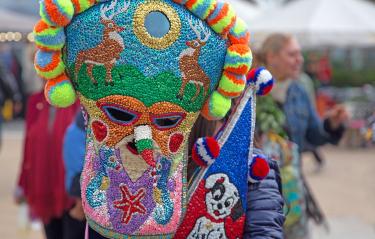
While Christmas is a family holiday, New Year is a time when many people go with friends to the city center or restaurants. A special tradition that can be seen in Bulgaria is horo dancing. People gather in a circle and dance to the melancholy music of gaida and rhythmic sounds of finger-drums. At home, a generous table is full of salads, snacks, meat, and drinks.
The 1st of January is a day off. The next official holiday will come only in 2 months. But this does not mean that the event calendar is empty.
Epiphany (St. Jordan’s Day) is celebrated on the 6th of January. According to tradition, people come to a lake, a river or a sea. The priest throws a cross into the water, and the bravest people dive after it. At the same time, everyone with the name of Jordan, celebrates a Name Day. By the way, Bulgarians have a special attitude to the tradition of Name Days. Often, they are celebrated with more attention and presents, than birthdays.
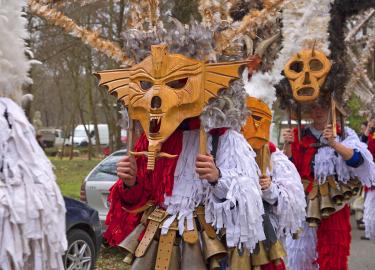 Some of the holidays have a specific date in the calendar, for example, Trifon Zarezan, dedicated to preparing vinery for spring. It is celebrated on the 14th of February, exactly on the same date, as St. Valentine’s Day. For many years, Bulgarians have disputed which is more important – Trifon Zarezan or St. Valentine. Each event has many fans and followers. Despite the disputes, there is one thing that unites everyone – an opportunity to sip a glass of delicious flavored wine.
Some of the holidays have a specific date in the calendar, for example, Trifon Zarezan, dedicated to preparing vinery for spring. It is celebrated on the 14th of February, exactly on the same date, as St. Valentine’s Day. For many years, Bulgarians have disputed which is more important – Trifon Zarezan or St. Valentine. Each event has many fans and followers. Despite the disputes, there is one thing that unites everyone – an opportunity to sip a glass of delicious flavored wine.
Other holidays are connected with a moon calendar and do not have an exact calendar date. Sirni Zagovezni is celebrated 7 weeks before Easter. This is a unique event. Mummers (kukeri) go along the streets, knock at the doors, and wish people health, long living, good harvest, and strong livestock. The main kuker wears a lamb wool vest, a wooden mask; on his belt, there is a phallus as a symbol of fertility. His retinue consists of doctors, policemen, priests. Often, they play a scene of bride kidnapping, dance horo with local people. And in the evening or the next day, a huge basket is burned to destroy dark forces.
Kuker’s traditions are so interesting and different, that corresponding festivals are being organized in some Bulgarian towns. Not only local mummers participate in these events, but also people from Serbia, Macedonia, and Moldova.
Spring holidays
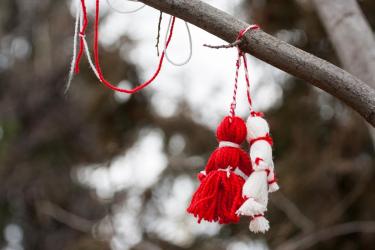 The first day of the spring is Grandma Marta Day. All the residents and guests of Bulgaria wear wristbands woven from red and white threads, decorated with bids. They are called martenitsa. Someone says that the tradition to wear them is connected with the creation of the Bulgarian Empire. Others tell the legend about brother and system – Pizho and Penda. Be that as it may, the tradition of wearing martenitsas is very beautiful, and there is no one who would not tie a bright bracelet on the wrist on the 1st of March. It can be taken off only when a person sees the first stroke. As soon as it happens, he ties the martenitsa to a flourishing fruit tree.
The first day of the spring is Grandma Marta Day. All the residents and guests of Bulgaria wear wristbands woven from red and white threads, decorated with bids. They are called martenitsa. Someone says that the tradition to wear them is connected with the creation of the Bulgarian Empire. Others tell the legend about brother and system – Pizho and Penda. Be that as it may, the tradition of wearing martenitsas is very beautiful, and there is no one who would not tie a bright bracelet on the wrist on the 1st of March. It can be taken off only when a person sees the first stroke. As soon as it happens, he ties the martenitsa to a flourishing fruit tree.
The Day of the Liberation of Bulgaria from the Ottoman Dominion is celebrated on the 3rd of March. It is the next tradition in a series of spring holidays and festivals. On this official day off, many Bulgarians, including officials and representatives of the clergy, go up the pike of Shipka (Stara Planina mountain), where in 1877 there was a decisive battle for the liberation of the country. In the evening, fireworks thunder in large cities.
A week before Easter, the date of which changes every year, Lazarovden (St. Lazarus Day) and Tsventitsa (Flowers’ Day) are celebrated. As it often happens, religious events are closely intertwined with people’s beliefs. In the church, believers glorify the deeds of Christ, sanctify willow branches, while outside, girls weave wreaths, sing songs, dance horo, and divine who will get married this year.
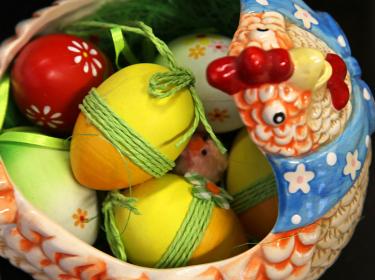 However, the main spring holiday is Easter (Velikden). As in many other countries, locals paint eggs, cook Easter bread, lamb dishes, and go to church.
However, the main spring holiday is Easter (Velikden). As in many other countries, locals paint eggs, cook Easter bread, lamb dishes, and go to church.
According to a tradition left over from communist times, Bulgarians celebrate Women’s Day on the 8th of March. For quite many years, this has not been a day off, however exactly on this date most of the women feel special and beloved. They get flowers, sweets, and wine.
Another spring holiday is the 1st of May – a Labor Day. Despite the fact that it is a day off, few people remember what it is connected with. Most of them go walking to parks, meet friends, and make barbecues.
Georgievden on the 6th of May is more popular. It is honored as a day of bravery or the Bulgarian Armed Forces Day. The symbol is St. George killing the dragon. Many people believe that it is a time when summer comes. This is especially so in villages when shepherds used to go up the mountains with a flock of sheep. The table necessarily includes fresh vegetables, baked lamb, and ritual bread.
The unique and interesting holiday is Bulgarian Education and Culture and Slavonic Literature Day celebrated on the 24th of May. It is a day off, and many people come to squares, participate in parades of letters, and folk events. Solemn atmosphere reigns in the Yard of Cyrillic alphabet in the ancient city of Pliska.
Summer holidays in Bulgaria
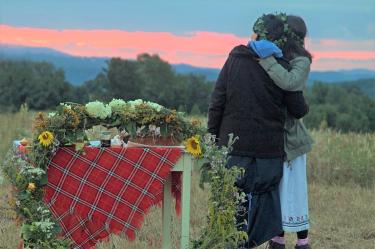 On the first summer day, Bulgarians celebrate Children’s day. Students of secondary schools and gymnasiums continue to study, but there is no doubt that each child will get a present from the parents, be it a balloon, a toy, or a visit to a theater or a café. On the 1st of June, you will find free performances, sports events, and shows in every town.
On the first summer day, Bulgarians celebrate Children’s day. Students of secondary schools and gymnasiums continue to study, but there is no doubt that each child will get a present from the parents, be it a balloon, a toy, or a visit to a theater or a café. On the 1st of June, you will find free performances, sports events, and shows in every town.
The Children’s Days is the only official holiday in the Bulgarian summer calendar. It is celebrated all around the country. The rest festivals and events are associated with religious, pagan, folk beliefs, and often acquire a local flavor.
One of the brightest examples is the St. Constantine and St. Helen day on the 3rd of June. It is celebrated in many regions but is the most popular and attractive in the village of Balgary, Burgas region. The celebration includes fire dancing performed by Nestinars. To see them, people come from different Bulgarian towns and other countries.
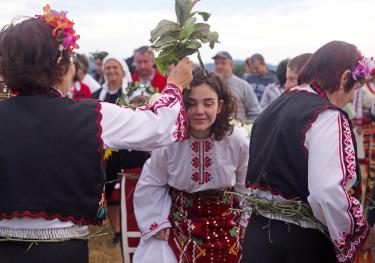 Two days after the summer solstice, on June 24, Eniovden is celebrated. It is believed that exactly in this time herbs obtain healing power. They are to be collected in the morning when covered with the dew. Locals believe that the water becomes healing as well, thus bathing in the due, washing the face with it, as well as drinking a herb tea is an inseparable part of the rite. Tutsans, yarrows, and thyme are used for weaving wreaths or tying bunches, so later in the winter, one could enjoy a flavored healing tea.
Two days after the summer solstice, on June 24, Eniovden is celebrated. It is believed that exactly in this time herbs obtain healing power. They are to be collected in the morning when covered with the dew. Locals believe that the water becomes healing as well, thus bathing in the due, washing the face with it, as well as drinking a herb tea is an inseparable part of the rite. Tutsans, yarrows, and thyme are used for weaving wreaths or tying bunches, so later in the winter, one could enjoy a flavored healing tea.
Summer is the time for festivals. In Burgas, Varna, festivals of wine, ice-cream, sea, literature are organized. In every village, a local fest is held. Everyone whose family comes from this village, participates in these events. Music sounds until late at night, a national soup kurban chorba is cooked on the fire, people dance horo. In most of the villages of the Burgas regions, Nestinars are invited for fire dancing shows. These events have a special atmosphere and charge with energy and power.
The 15th of August is an interesting day as well, Bulgarians honor the Dormition of the Mother of God. On the same date, Varna has a City day.
Autumn holidays
The first autumn event is September 6, and it is a Unification Day of Bulgaria. Solemn meetings and fireworks are held l around the country.
September 15 has a completely different atmosphere. It is not marked in the calendar, but is known by all the Bulgarians. This is the date when children go to school. Most of them are happy to meet friends, teachers, to join school events and classes, and, often, to get small gifts from parents.
A week later, on 22 September, is a Day of Bulgarian Independence. Back in 1908, an act of political and financial independence from the Ottoman Empire was signed in the city of Tarnovo. Nowadays, a spectacular laser show is held in Veliko Tarnovo every year.
Dimitrovden (St. Dimitar Day) is a church holiday honored in Bulgaria on the 26th of October. This day, people say goodbye to summer and greet winter – according to an ancient legend, St. Dimitar rode a red horse, and snowflakes flew from his beard.
One of the most controversial holidays is Halloween, October 31. Many Bulgarians are against this event. Others, especially children, enjoy wearing masks, costumes of monsters and zombies, share candies, and play horror scenes.
In contrast to Halloween, Bulgarians celebrate the 1st of November – a date devoted to national educators and scholars who proved the importance of education and called local people to revive.
Many citizens of the EU, Israel, England, and other countries who have already bought the property in Bulgaria or just plan to buy an apartment or a house, get surprised that the festive calendar in this country is so rich. The main reason is that Bulgarians have a millennial history and carefully preserve many traditions. Our excursion included only the brightest events. But we are sure that wherever you buy an apartment in Bulgaria, you will learn about many other holidays and would love to participate in them.